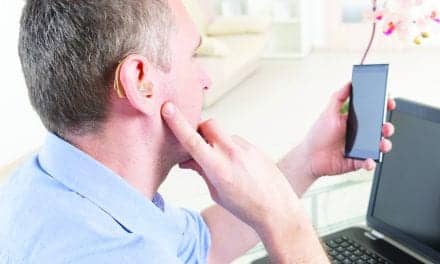April 25, 2008
ST LOUIS — In conjunction with Better Speech and Hearing Month in May, Energizer Battery Inc. conducted a recent survey of Baby Boomers whose spouses suffer from hearing loss to understand how a hearing impairment can affect a relationship. The survey found that nearly half (47.8%) of the respondents feel that their marriage has suffered because of their spouse’s hearing loss.
The survey, which polled men and women ages 44 to 62, is part of the Energizer Specialty Batteries division that supports the “KEEP GOING®, Live Healthy” campaign. This campaign encourages baby boomers to lead healthy, active lifestyles – with some help from battery-powered devices.
The survey was conducted online with a random sample of 1065 men and women who have a spouse that suffers from hearing loss – all members of the CyberPulse™ Advisory Panel. This Advisory Panel has been carefully selected to closely match US population demographics, and the respondents are representative of American men and women ages 18+. The research was conducted in March 2008, and the overall sampling error rate for the survey is reportedly ±3% at the 95% level of confidence.
Key survey findings include:
Being hard of hearing can cause hard feelings. Nearly 7 out of 10 (64.8%) respondents feel annoyed when their spouse cannot hear them. In addition, 16.4% feel ignored and 8.1% feel sad or hurt.
Raised voices become more familiar. More than half (59.8%) find themselves in recent years talking louder daily so their spouse can hear them. And 83.4% feel that, if they do talk loud enough, it helps their spouse better understand what they are saying.
Is it hearing loss or selective hearing? While 45.3% of respondents believe their spouse doesn’t hear chore requests, 77.5% say their spouse can hear them fix a snack.
Nearly half believe their spouse is in denial about their hearing loss. Of the Boomers surveyed, 56.8% feel their spouse is reluctant to get his/her hearing checked. Nearly half (46.4%) feel that denial is the number-one reason their significant other is hesitant to get his/her hearing checked.
Hearing screenings are few and far between. More than a third (35.6%) know their spouse hasn’t had his or her hearing checked in more than 3 years. Moreover, 23.4% revealed that their spouse has never had his or her hearing checked.
“This study illustrates that hearing loss affects more than the person experiencing it,” says Bary Williams, AuD, an audiologist based in Kansas City. “Whether it is diagnosed hearing loss or a slight case of selective hearing, couples must work together and encourage healthy hearing habits.”
Williams also stresses the connection between hearing screenings and maintaining a high quality of life. For example, untreated hearing loss could mean the difference between living independently and requiring assistance, says Williams. “If you can’t hear the phone, doorbell, fire alarm, etc, it’s going to be extremely difficult to maintain your independence. If you have a hearing issue—and one-third of boomers think they do—get a hearing screening to determine if you need a hearing aid,” he advises. “If not, you put yourself and others at risk.”
And for those who need a hearing aid, Williams says don’t despair: “Thanks to technological advancements in hearing devices and their batteries, people can find solutions to meet their specific needs and lifestyles.” Energizer has introduced new perforated packaging for its hearing aid batteries that is easier and more convenient to carry and use. Energizer also continues to offer the Energizer® EZ Change®, the first and only hearing aid battery dispenser that allows users to insert their batteries without having to handle the tiny batteries or tabs.
“We know it is often difficult for people in a relationship to overcome the stigmas related to hearing loss, and we’re trying to set the record straight through this program,” says Stacey Harbor, director of marketing for Specialty Batteries at Energizer. “We want to educate people about hearing loss prevention, as well as provide solutions for others to manage their hearing health, so they can live active and enjoyable lifestyles.”



